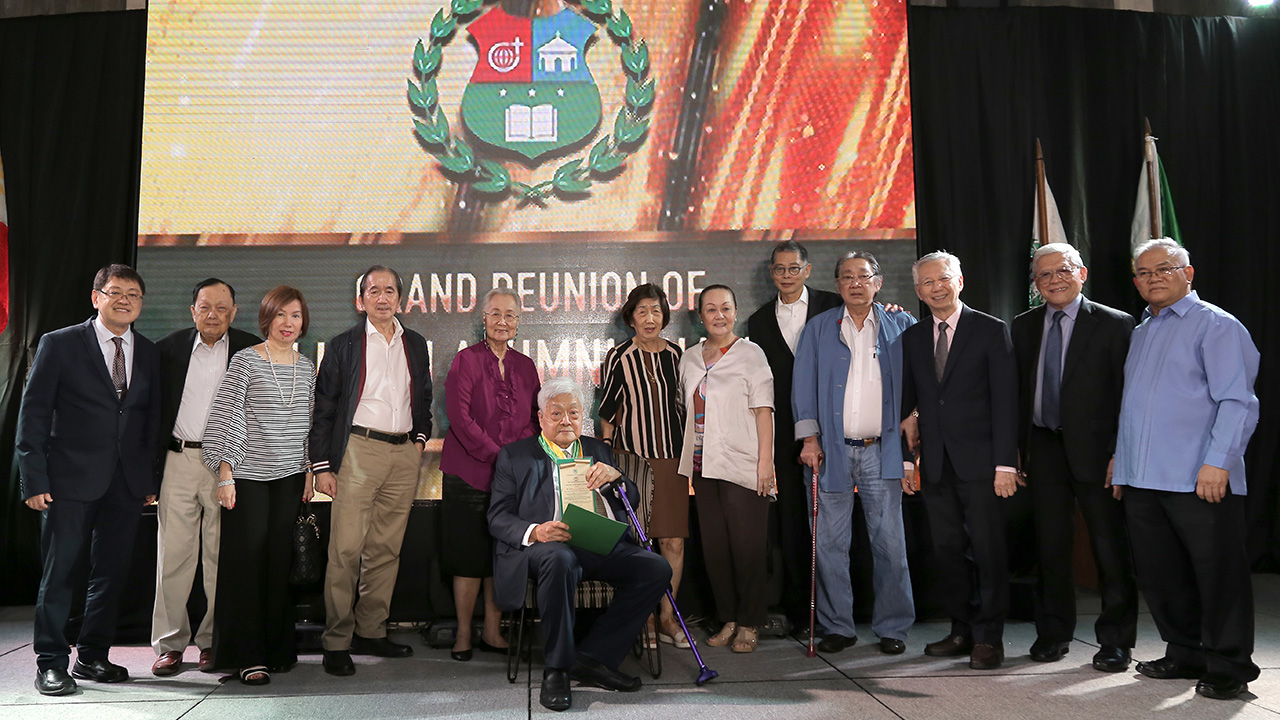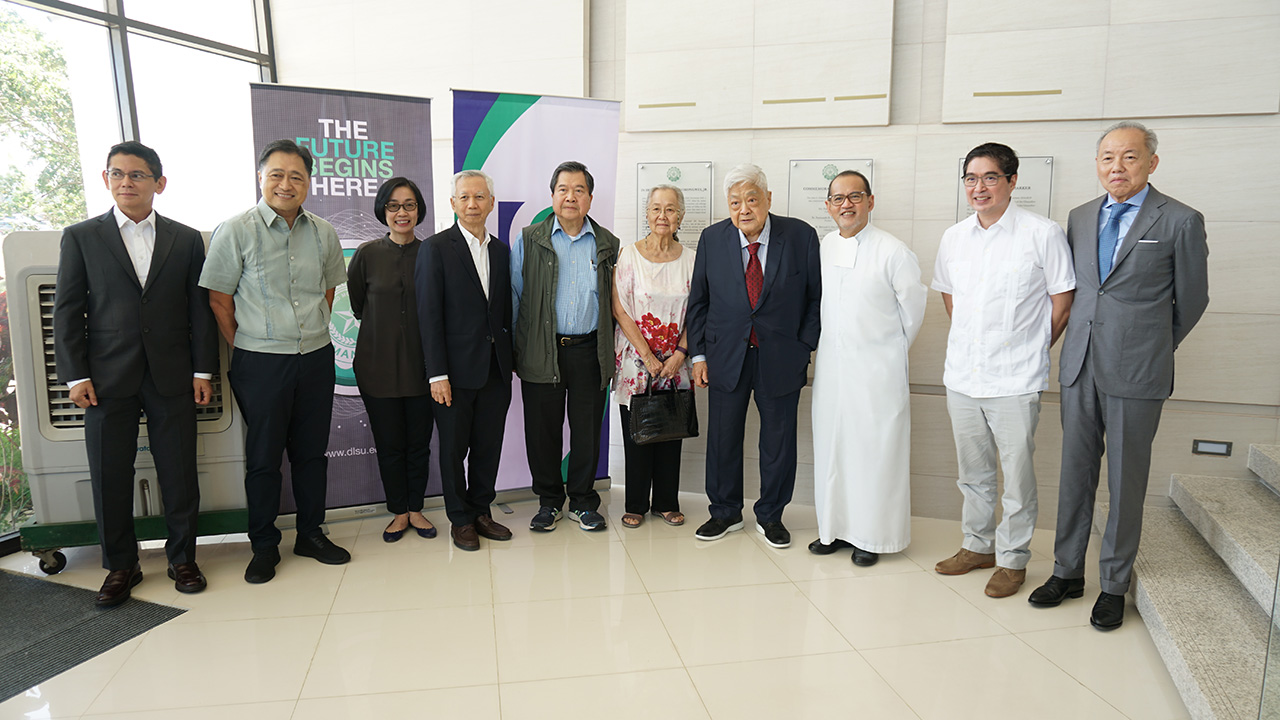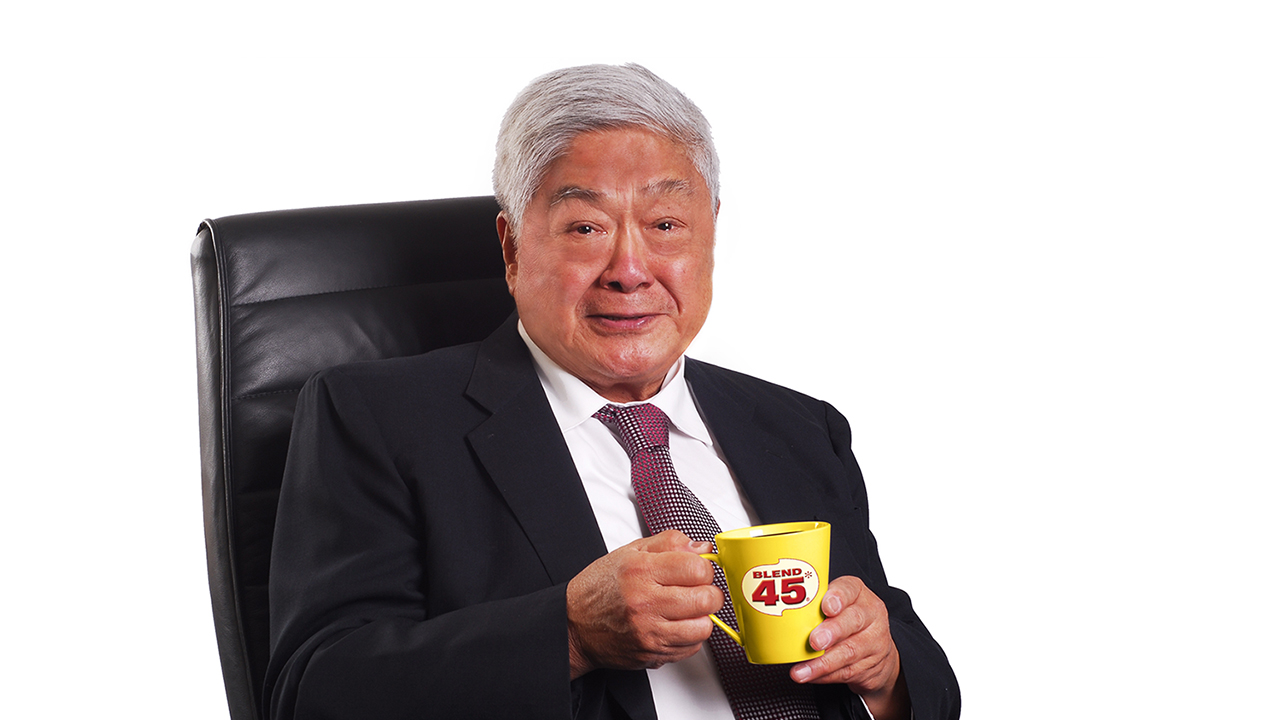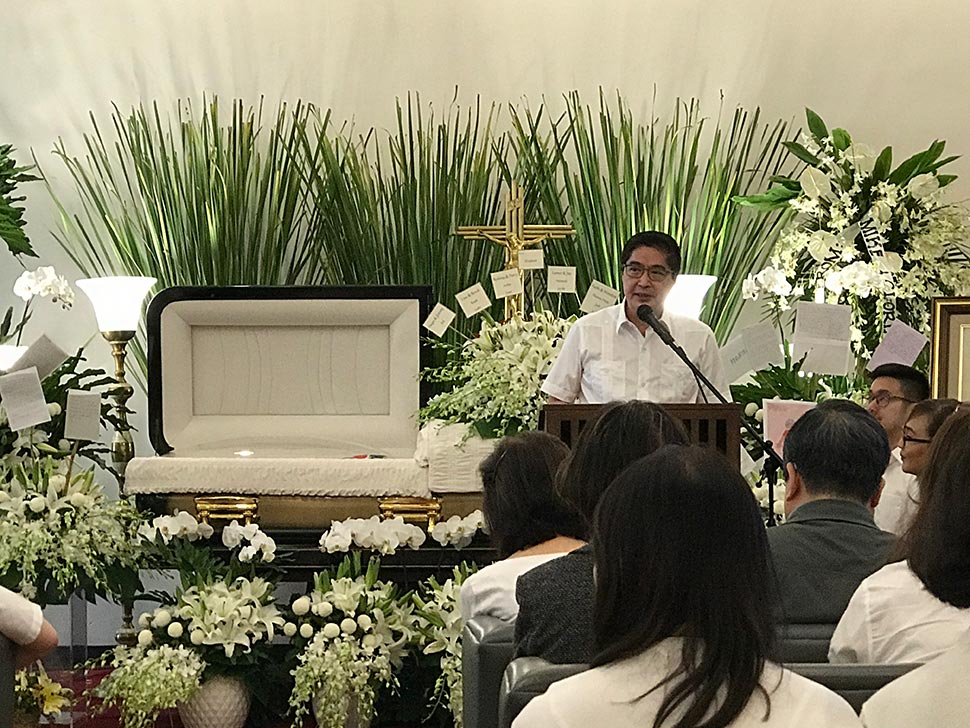When John Gokongwei Jr., the founder and chairman emeritus of JG Summit Holdings, passed away peacefully at the age of 93, it was a great loss not only to his family—his wife Elizabeth, children Robina, Lance, Lisa, Faith, Hope, and Marcia—but also for the employees in the conglomerate’s various companies and the countless Filipinos whose lives have been influenced and shaped by Mr. John’s businesses and philanthropic endeavors.

Mr. John surrounded by family members, friends, and officers from the University of San Carlos, as he received the Lifetime Achievement Award from his alma mater in 2018.
It’s an oft-repeated fact that Mr. John’s business career began when he was only 13 years old, as he had to provide for his family after the untimely death of his father. And while Mr. John held an official retirement ceremony when he was in his 60s, it’s common knowledge that he didn’t really retire until a few years ago, when he was 90. In those eight decades of working, he built a business empire that at various points included telecommunications, banking services, textiles, petrochemicals, power generation, aviation, consumer food & beverages, and commodities.
Of course, turning a profit was important to the company, but more than that, it had a greater purpose—to make life better for every Filipino. Over the years, that has been manifested in myriad ways—affordable yet high quality food, cheaper phone calls and airline tickets, and even free schooling for disadvantaged but deserving scholars through the Gokongwei Brothers Foundation.

Mr. John at the unveiling of the John Gokongwei Jr. Innovation Center at the De La Salle University-Laguna Campus earlier in 2019. From left: Gerardo Amisola (DLSU Trustee), Cesar Purisima (DLSU Trustee), Lisa Gokongwei-Cheng (GBF General Manager), Tony Go (GBF Trustee), James Go (GBF President), Elizabeth Gokongwei (GBF Trustee), John Gokongwei Jr. (GBF Chairman), Br. Bernard Oca FSC (DLSU Chancellor), Lance Gokongwei (GBF Secretary), and Robert Coyiuto Jr. IMAGE JG Summit Holdings
In the companies that he founded, which now employ a workforce of 75,000 people, his passing will be greatly felt and lamented. The task of filling his shoes has been placed on his son, Lance Gokongwei, the president and CEO of JG Summit Holdings.
In his farewell to his father, Gokongwei painted a clearer picture of the conglomerate’s founder, sharpened by the perspective of their close and profound father-son relationship. His father’s traits of being frugal, practical, hardworking, passionate and innovative were brought to the fore in a eulogy that was moving yet brimming with precious light moments—a fitting homage to the larger- than-life man known for his hearty sense of humor.
In the eulogy, examples of Mr. John’s legendary frugality were plenty. “Dad was famous for keeping food in his pocket to tide him over when he was hungry,” said Gokongwei. “He would stick his hand in his suit pockets and pull out peanuts still in their shells and offer them to people at his business meetings. I remember a trip to France. We bought some bleu cheese in the train station, and he put it in his pocket. Later, at a meeting, I could smell the bleu cheese that was staining his pants. It smelled so bad and I was so embarrassed, but Dad didn’t care. He had saved several euros by not having to buy lunch.”
Travel was another one of Mr John’s passions, but again, true to nature, if he could find a way to save a few pesos on the journey, he would. “Our trips back then were also extra long, because Dad always took the cheapest fare. Since direct flights are always more expensive, he was willing to make stopovers for a cheaper price. We once traveled for over a day just to get from England to the US via Germany (even if England was already closer), but hey, it was a good deal,” Gokongwei reminisced.

When asked last year if he had a favorite between his famous coffee brands, Blend 45 and Great Taste, he had a ready answer for jgsummit.com.ph: "Both!"
Like many of the innovations Mr. John became famous for, the airline he founded, Cebu Pacific, was born out of the desire to fill a vacuum. In this case, the Filipinos’ need for more affordable travel. It made sense for the family to be the ones to fulfill it, because, “We’re all used to flying economy,” joked Gokongwei. Later, he explained, “Till today, I think Dad was most successful with businesses that catered to the every man, the common man, because that’s who he was himself.
“From producing snacks like Chippy that are part of every Filipino’s childhood memories, to Robinsons malls with affordable necessities, to Sun Cellular that had cheaper rates than the competition, to Cebu Pacific, the budget airline, so that every Juan can fly.”
While employees paused to reflect and honor their company’s founder, hundreds, if not thousands, lined up every day to say their final goodbyes, the interruption to conglomerate-wide operations was brief; life, after all, must go on. And that included Mr. John’s immediate family. “This past week we started the wake at lunch because my sisters and I still squeezed in all our meetings in the mornings. The only day we cancelled meetings were for today because we have a funeral to attend. That’s how Dad would’ve wanted it. Business as usual.”

Lance Gokongwei, Mr. John's second child and only son, giving a eulogy to honor his father.
Yes, Mr. John had a no-nonsense business approach and his work ethic was second to none. However, that didn’t mean that he didn’t have a life outside of work. Family was important to him, and he made it a point to spend time with his own. “While we were growing up, Dad worked very hard six days a week, many hours a day. But he always made sure that when we sat down for dinner at 7:30 p.m. after a long school day, he was there to join us after a long workday as well. Some days he had to leave after dinner to go back to the office or to go to another meeting, but at dinnertime, he was there with us. Dad’s presence made me realize that despite the pressures from his growing business, our family was always important to him,” said Gokongwei.
Now that the conglomerate’s founder is no longer around, Lance Gokongwei has stepped up to the plate. Concluding his eulogy, he spoke of a vow made to his father, to guide the JG Summit family onward to the next chapter of the conglomerate’s unfolding story.
“I promised Dad I would always take care of the company. There is a greater purpose than ourselves. We share all of our successes with our employees, the communities in this country we love, our business partners, and our customers. They are all part of our family story.
“This is Dad’s life’s work. This is his legacy. It is what is important to him.
“Dad, I’m grateful for all the opportunities you have given me. I take on the responsibility you have left me. You have passed the baton on to me.
“I accept it humbly, gratefully, with open hands, heart, and mind. And I am running with it.”
Lance Y. Gokongwei's eulogy for his father, John Gokongwei Jr., can be read below:
On behalf of my mother, Elizabeth, my sisters, Robina, Lisa, Faith, Hope, and Marcia, my uncles Eddie and James, my auntie Lily, my wife Jay and my children, in-laws, cousins, nieces and nephews, I would like to thank everyone who has come to visit our family here at Heritage Park over the past five days.
Dad was not very sociable, so he would’ve been astounded to see the thousands and thousands of people who have come to pay their respects to him over this past week.
Thank you to the excellent medical staff at Manila Doctors led by Dr. Morales, Dr. Juco, and Dr. Obrado. Special thanks to Dad’s regular companions over the past few years, his nurses Jenny and Delfin, his bodyguards Bong and Macoy, and his BFF, Uncle Antonio Go.
The past few days have been a celebration of Dad’s storied life. 93 years, what a long life. And he lived it to the fullest.
So many people have come up to us to share stories about their personal interactions with him. His childhood best friend, Auntie Pacita Tiong, showed up on Monday and shared funny stories about Dad that made us all laugh. She remembered how one day in 1939, Dad, a distant relative whose father just passed away, showed up at the house of his uncle, her father, Manuel Gotianuy, and ended up living with them. Dad and Auntie Pacita were about the same age and became inseparable. They used to tease each other a lot. Dad called Auntie Pacita “sungki” because she had crooked teeth, and drew pictures of crooked teeth everywhere. Auntie Pacita got so angry, she stabbed him with a pencil in his side. To retaliate, Dad also stabbed her with his pencil, on her arm. On Monday, Auntie Pacita raised her sleeve and showed my sisters the pencil mark on her arm. 80 years later, it’s still there. Shall we check if Dad’s is still there too?
Another story Auntie Pacita told us is about how she would take a calesa ride home from school every day for 10 centavos. Dad didn’t want to pay for his own calesa ride so asked Auntie Pacita if he could share a ride with her. Sure, said Auntie Pacita, but said they would have to split the fare. However, whenever the kalesa was halfway home, Dad would jump off the kalesa and walk the rest of the way home. That meant he didn’t have to pay for his half of the kalesa ride, right?
These last few weeks must’ve been the hardest ones of all for Dad. After all, since the death of his father when he was 13 years old, Dad had always been in control, he had taken charge of everything and made all the decisions on his own. So it must have been extremely challenging and frustrating to be in that hospital bed surrounded by all those machines. Dad was used to taking care of people, not being taken care of.
He must’ve hated the idea of just lying there, not being able to read his piles of books, not being able to eat the food he had worked so hard to pay for. As we all know, one of his classic lines was, “If you don’t work, you don’t eat.” And boy, did he have a lifetime of eating. It came from a lifetime of hard work.
Many people tell the story of how Mr. John always carried food in his pocket. Dad was famous for keeping food in his pocket to tide him over when he was hungry. He would stick his hand in his suit pockets and pull out peanuts still in their shells and offer them to people at his business meetings. I remember a trip to France. We bought some bleu cheese in the train station, and he put it in his pocket. Later, at a meeting, I could smell the bleu cheese that was staining his pants. It smelled so bad and I was so embarrassed, but Dad didn’t care. He had saved several euros by not having to buy lunch.
Another thing I remember about traveling with Dad during my younger days is having to share a hotel room with him. The problem is Dad snored really LOUD (I must say Mom is really a saint to have put up with THAT SNORING for 61 years). In my case, I didn’t put up with it. So I walked out… out of the bedroom and into the bathroom where I spent the night sleeping in the bathtub.
Our trips back then were also extra long, because Dad always took the cheapest fare. Since direct flights are always more expensive, he was willing to make stopovers for a cheaper price. We once traveled for over a day just to get from England to the US via Germany (even if England was already closer), but hey it was a good deal.
Dad also always flew economy, until he got too big to fit in the seats. My sisters and their families still always fly economy whenever we take family trips together. I think it’s also for them to prove they are still skinny enough to fit in economy class seats. That’s why we set up Cebu Pacific, a low-cost carrier, because we’re all used to riding economy.
Over the last few weeks, whenever I visited Dad in the hospital, the larger than life man looked so small in his hospital bed, and he knew it. That’s why he kept shooing us away from the hospital as soon as we arrived. Even if we had spent two hours in traffic getting to the hospital, he was shooing us away after two minutes.
First of all, he didn’t want our pity. Second, and more importantly, being with him at the hospital meant we weren’t at work, and he always wanted us at work. He always said we have a responsibility to our employees to make sure our businesses are sustainable so that their jobs are secure with enough income to provide for their families.
This past week we started the wake at lunch because my sisters and I still squeezed in all our meetings in the mornings. The only day we cancelled meetings were for today because we have a funeral to attend. That’s how Dad would’ve wanted it. Business as usual.
Our going to work is a tribute to Dad, who always believed in the dignity of work. His life’s work, his life’s legacy was the company he built, 75,000 strong. While I was growing up, Dad always told me I have to make sure this company continues to grow, create employment, and contribute to the nation for many generations.
But it wasn’t always about work. While we were growing up, Dad worked very hard six days a week, many hours a day. But he always made sure that when we sat down for dinner at 7:30 p.m. after a long school day, he was there to join us after a long workday as well. Some days he had to leave after dinner to go back to the office or to go to another meeting, but at dinnertime, he was there with us. Dad’s presence made me realize that despite the pressures from his growing business, our family was always important to him.
When Dad turned 90, I wrote a book called Lessons from Dad. I shared nuggets of wisdom I had learned from him. I was very surprised by how many people have told me they have read the book, and have been inspired. To me, he was Dad, and I had written stories about family. But to others, he was Big John, larger than life, and they loved reading those stories about him.
To be honest, they were ordinary, everyday stories about a regular human being who happened to be my Dad, and I think that’s what appealed to people most.
How he was human, how he was real. How he went against all odds to become successful. Many people know the story of how Dad’s Dad, my Angkong, had once owned a movie theater, and how it was taken from them by creditors after Angkong died. So at 13, Dad stopped school and sold peanuts with garlic to his friends. At 15, he got on his bicycle way before dawn to sell thread, soap and candles at the market.
Till today, I think Dad was most successful with businesses that catered to the every man, the common man, because that’s who he was himself.
From producing snacks like Chippy that are part of every Filipino’s childhood memories, to Robinsons malls with affordable necessities, to Sun Cellular that had cheaper rates than the competition, to Cebu Pacific, the budget airline, so that every Juan can fly.
Dad was an every Juan, a simple man who wore ill-fitting clothes, whose ties were almost always stained, who loved to stay home and read his piles of books.
But he was an every man who had a vision. He loved his family, he loved his employees, he loved his country.
When Dad turned 80, he put half his fortune in the Gokongwei Brothers Foundation, specifically earmarked for education. In honor of GBF’s endowments, Ateneo University and De La Salle University renamed their departments the Ateneo de Manila John Gokongwei School of Management and the De La Salle University Gokongwei College of Engineering. The foundation also supports over 600 students, primarily in engineering and vocational technology every year.
Dad stopped being active in management when he was 90, but he still was very visible in the business till the very end. He would show up unannounced in a factory or a new building. Earlier this year, he attended the inauguration (and official unveiling of the marker) of the John Gokongwei School of Innovation at De La Salle University in Laguna. In August, he attended the re-dedication of the Gokongwei Jr. High School at Xavier. His last public event when was we launched our Bridgetown township back in September.
During the many conversations we shared, Dad said my role is to take care of the family and the company. They’re practically one and the same since my family is part of the company, and the people who work in our company are really part of our family. There are 75,000 people who work with us. That means 75,000 families who depend on the success of the company.
I promised Dad I would always take care of my family—my mother, my sisters, my wife, my children, and our extended family.
I promised Dad I would always take care of the company. There is a greater purpose than ourselves. We share all of our successes with our employees, the communities in this country we love, our business partners, and our customers. They are all part of our family story.
This is Dad’s life’s work. This is his legacy. It is what is important to him.
Dad, I’m grateful for all the opportunities you have given me. I take on the responsibility you have left me. You have passed the baton on to me.
I accept it humbly, gratefully, with open hands, heart, and mind. And I am running with it.
Banner image taken from Summit Books' "Lessons from Dad, John Gokongwei, Jr." by Lance Gokongwei with Yvette Fernandez


